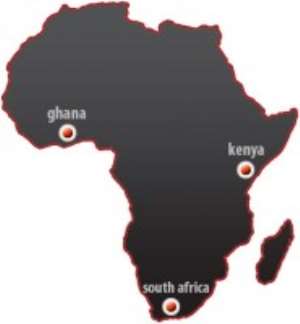
CEIBS Africa successfully held the 2nd Edition of its Executive Talk series on Thursday 19th of November, 2015 with Dr. Edward K. Brown, Director, Policy Advisory Service at the Africa Centre for Economic Transformation (ACET) as the speaker. He spoke on the subject “Transforming African Economies – the ACET Perspective” at the CEIBS Africa facility at Airport City, Accra. In attendance were business leaders such as CEOs, Managing Directors, General Managers, Country Directors of MNCs in West Africa, government policy makers and advisors, senior public and civil servants etc. and CEIBS Alumni and current EMBA students.
The Executive Talk event organized by the Executive Education department of CEIBS Africa serves as a platform where business leaders and policy makers share their insights on relevant issues concerning business and the economy. Dr. Brown drew extensively on his experience at the World Bank and the work of African Center for Economic Transformation (ACET) on how African countries can achieve economic transformation or growth with DEPTH which he defines as: D = diversification of economic production and exports, E = Export competitiveness, P = Productivity increases, T = Technological upgrading, H = Human wellbeing improvement.
Dr. Brown begun his presentation by stating that the ‘African rising’ narrative is nice to hear, but questioned whether it is premised on transformational growth. For the growth to be sustainable, it must make Africa internationally competitive and resilient, and it must lead to the expansion of formal employment and shared prosperity, he explained. Explaining further using data from a study of Sub Saharan African economies, he mentioned African countries have achieved high growth rates before in the past. However, owing to the fact that African economies have not transformed in the past 40+ years, the growth was not sustainable and it was actually followed by two decades of economic collapse. Nonetheless, Africa has the benefit of the late comer’s advantage here and can learn from the successes and failures on the continent as well as from the experiences of the early transformers like Thailand, Brazil, Singapore, Malaysia, Chile, Republic of Korea etc. Dr. Brown stated that in order for there to be an economic transformation in Africa, pragmatic approaches need to be explored.
He identified 3 key drivers to achieve this. They are Public-Private sector partnership, Export Promotion and Technical Knowledge and Skills upgrading. With the public and private sector, He stated the need for partnership to establish regular dialogue with the business community on how government policies affect them and seek the input of the business community to foster medium to long term planning. While the private sector leads in production and marketing of goods and services, creating jobs and expanding exports, the State must strengthen its own institutional capacity for economic management so that businesses can thrive. It is the role of the state to guide transformation by setting national vision and strategy, he said.
According to Dr. Brown, exports are critical for economic transformation. They were for South East Asia and will be for Africa despite changes in the global environment. A clear Export Promotion Strategy must be defined based on Sub Saharan Africa’s comparative advantage of abundant cheap labour and natural resources. Gaining improved market access to OECD countries as well as emerging markets like China, India , Brazil etc, will help as well as supporting the development of skills necessary for exports promotion focused on manufacturing, agro processing, efficient management of oil and gas, minerals and tourism. He emphasized that in order to promote employment generating transformation, African countries need to re-orient the nature of training and education they offer and shift priority to technical and vocational education and training (TVET).
Dr. Brown added that a regional integration will also aid in accelerating the economic transformation by widening markets to make countries attractive locations, increase competitive development of some industries and provide some degree of natural protection for domestic firms and strengthen their competitive position.
In concluding, Dr. Brown stated that, recent growth provide hope and the foundation to build on. Africa must transform, he said. Africa can transform its economies to make growth durable, become competitive in a widening array of sophisticated goods and services, and expand employment opportunities for its youth to produce widely shared prosperity. He stated “we have to act to transform hope into reality”.
During the Q&A session that followed the presentation, some participants shared their experience and thoughts on the subject. The evening also provided a networking platform for participants.
Source: Ben Ofosu - Appiah




 Lay KPMG audit report on SML-GRA contract before Parliament – Isaac Adongo tells...
Lay KPMG audit report on SML-GRA contract before Parliament – Isaac Adongo tells...
 Supervisor remanded for stabbing businessman with broken bottle and screwdriver
Supervisor remanded for stabbing businessman with broken bottle and screwdriver
 NDC watching EC and NPP closely on Returning Officer recruitment — Omane Boamah
NDC watching EC and NPP closely on Returning Officer recruitment — Omane Boamah
 Your decision to contest for president again is pathetic – Annoh-Dompreh blasts ...
Your decision to contest for president again is pathetic – Annoh-Dompreh blasts ...
 Election 2024: Security agencies ready to keep peace and secure the country — IG...
Election 2024: Security agencies ready to keep peace and secure the country — IG...
 People no longer place value in public basic schools; new uniforms, painting wil...
People no longer place value in public basic schools; new uniforms, painting wil...
 'Comedian' Paul Adom Otchere needs help – Sulemana Braimah
'Comedian' Paul Adom Otchere needs help – Sulemana Braimah
 Ejisu by-election: Only 33% of voters can be swayed by inducement — Global InfoA...
Ejisu by-election: Only 33% of voters can be swayed by inducement — Global InfoA...
 Minority will expose the beneficial owners of SML, recover funds paid to company...
Minority will expose the beneficial owners of SML, recover funds paid to company...
 Prof. Opoku-Agyemang has ‘decapitated’ the NPP’s strategies; don’t take them ser...
Prof. Opoku-Agyemang has ‘decapitated’ the NPP’s strategies; don’t take them ser...
